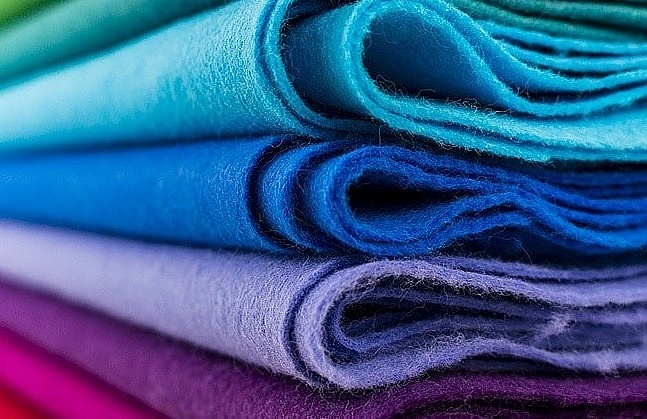Polyester up next for US trade tariffs
 |
| Polyester up next for US trade tariffs - illustration photo, source internet |
The US Department of Commerce (DOC) is expected to officially impose tariffs on Vietnamese polyester texturised yarn (PTY) products on December 3, based on the final affirmative determination report published by the International Trade Administration at the end of October. For now, the DOC is maintaining its preliminary measures until further notice.
The US had opened an anti-dumping duty investigation on polyester yarn products imported from Vietnam, Indonesia, Malaysia, and Thailand last November, signifying the possibility of import taxes for yarn.
On October 19, the DOC determined a dumping margin of 2.58 per cent, a decrease of 0.09 per cent compared to the preliminary margin of 2.67 per cent for Vietnam’s Century Synthetic Fiber Corporation. The tax rate for this company is low compared to those of other countries under investigation, which are taxed with 7.45 per cent or more. However, the remaining Vietnamese companies are all subject to a tax rate of 22.36 per cent, down 0.46 per cent from the preliminary margin of 22.82 per cent.
In this investigation, “the US still does not consider Vietnam a market economy, and used India’s data for reference,” said Nguyen Phuong Chi, chief strategic officer of Century Synthetic Fiber. “If we can use our documents, we could enjoy a zero per cent tax rate.”
This year was considered a successful one for Vietnam’s yarn industry, evident by the sudden growth in both export volume and turnover. According to the General Department of Vietnam Customs, Vietnam’s export turnover of PTY in the first nine months of 2021 was more than $243 million, of which exports to the US reached $5.3 million, accounting for about 2.2 per cent of total exports and equivalent to an increase of 74 per cent over the same period in 2020.
According to analysis from the Vietnam National Textile and Garment Group, yarn inventories in China and other countries have been exhausted, and there is currently a ban on the import of products derived from Xinjiang cotton by China.
US policy has strongly affected the yarn supply and demand chain, causing demand for yarn to increase. Along with that, the economic development stimulus packages of developed countries and widespread vaccinations have also enabled the world economy to recover, with textile and garment demand prospering again after a broken chain in 2020.
Vietnam’s yarn industry reserves more than 70 per cent of its output for export, of which exports to China account for up to 70 per cent. On the other hand, the main input source of the yarn industry is cotton, which is imported with more than 50 per cent from the US, with the rest coming from Brazil, India, Australia, and West Africa, among others.
“Enterprises wishing to export PTY to the US can ask the DOC to review their request following the new exporter mechanism to enjoy separate tax rates,” said Chu Thang Chung, deputy director of the Trade Remedies Authority under the Ministry of Industry and Trade (MoIT).
Trade remedy investigations have been continuously initiated by the US despite in recent years. According to Chung, businesses need to learn about the legal regulations and practices of trade remedies of exporting countries, especially for target markets. Chung did not comment on the possibility of the DOC imposing formal tariffs.
“There is a high possibility that the DOC will officially impose taxes this week,” commented Chi. However, the company’s investigation can be a good experience for businesses to enjoy lower tax rates.
According to Chi, businesses need to participate in such cases actively and fully in accordance with regulations, as well as cooperate with foreign investigation agencies during the process and closely monitor information from the agency.
Chi also encouraged businesses to consider using a consultant who is knowledgeable about the trade remedy laws of the World Trade Organization and the investigating country. At the same time, enterprises could receive guidance from the Trade Remedies Authority, in trade agreements, and associations and other businesses.
“Enterprises deemed non-cooperating or offering insufficient cooperation will likely be subject to taxes based on irregular data collected by the investigating agency, often at a high level, leading to the risk of losing the export market entirely,” Chi warned.
What the stars mean:
★ Poor ★ ★ Promising ★★★ Good ★★★★ Very good ★★★★★ Exceptional
Latest News
More News
- State corporations poised to drive 2026 growth (February 03, 2026 | 13:58)
- Why high-tech talent will define Vietnam’s growth (February 02, 2026 | 10:47)
- FMCG resilience amid varying storms (February 02, 2026 | 10:00)
- Customs reforms strengthen business confidence, support trade growth (February 01, 2026 | 08:20)
- Vietnam and US to launch sixth trade negotiation round (January 30, 2026 | 15:19)
- Digital publishing emerges as key growth driver in Vietnam (January 30, 2026 | 10:59)
- EVN signs key contract for Tri An hydropower expansion (January 30, 2026 | 10:57)
- Vietnam to lead trade growth in ASEAN (January 29, 2026 | 15:08)
- Carlsberg Vietnam delivers Lunar New Year support in central region (January 28, 2026 | 17:19)
- TikTok penalised $35,000 in Vietnam for consumer protection violations (January 28, 2026 | 17:15)

 Tag:
Tag:














 Mobile Version
Mobile Version